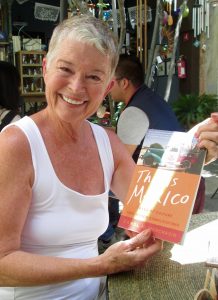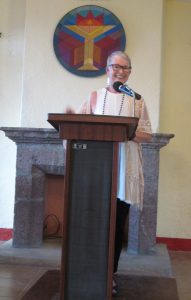This being graduation season, one of the questions I asked author Carol Merchasin, when I interviewed her here in San Miguel de Allende recently, was what she would say to a graduating class at a women’s college today if she were to give the commencement address.
She was ready with an answer. She said that in fact she’d given such a speech two years ago at her alma mater, Cedar Crest College in Allentown, Pennsylvania.
“What I would tell them today,” she told me, “is there are a lot of smart people in the world – such as here in Mexico – who are too poor to have had the advantages that you have. It’s important to remember just how privileged you are because when you forget that, you’ve forgotten that you need to pay back. We are our best selves when we remember that in the ocean of humanity we were the ones on the lifeboat. This gives us a responsibility to act out of our best selves – and to pay back.”

Carol, who turned 71 last month, is the author of the acclaimed essay collection about the expat experience in Mexico, This is Mexico: Tales of Culture and Other Complications, (She Writes Press, Berkeley, CA, 2015), which I have written glowingly of and quoted from in two previous blog posts (see “The Meaning of Mañana,” March 6, 2015, and “The Language of Smiles,” June 4, 2015).
She jokingly refers to herself as “a recovering lawyer,” after having had a long legal career, most recently in Philadelphia. She and her husband Robert (“Señor Roberto” to her readers) moved to San Miguel de Allende, this charming colonial town in Central Mexico which I, too, now call home, in 2006.
In the Preface to This is Mexico, Carol shares some of her reasons for “paying it back” to Mexico by writing her true, heartfelt, and humorous stories that celebrate real life here:
“It is estimated that almost one million Americans live in Mexico, while another 21 million travel and vacation here. Forty million U.S. baby boomers between the ages of 55 and 65 may be looking to live in Mexico – its proximity to the United States, moderate climate, and lower cost of living are appealing. But often, our images of Mexico are limited to beach resorts, a campesino sleeping under a cactus, or beheadings by the drug cartel. While all of these images exist, they are not the whole story. Not by a long shot.”
Other than her legal writing, This is Mexico, which Carol began writing at age 65, was her first “real” — that is to say, she said, “creative” — published work. She considers it her greatest artistic accomplishment to date because she had to “learn how to do it and then have the discipline to stick with it,” she said. Now Carol is busy writing her first novel, also set in Mexico, tentatively titled “The Limits of Their Longing.”

As a creative writer now, Carol believes “you cannot do creative work by waiting for the inspiration to hit you,” so she adheres to what she refers to her as her “string of daily rituals” in 90-minute blocks: She wakes at 5:00 most mornings, does her meditation practice, writes out her day’s plan, works on her novel, goes for a long run (with “Señor Roberto”), comes home and has breakfast, then goes on with her day.
“I’m a great believer in ‘as the day goes, so goes the life,’” she said. “The way that your day plays out is the way that your life plays out. So I think about the things that are most important to me, and I do those things first in the day.”
It occurred to me as Carol and I were talking over tea last week in San Miguel that she would be the perfect commencement speaker, too – in this season of commencement addresses — for elders, also known as seniors, about to graduate from the working world (“the University of Hard Knocks,” as my father used to call it) and enter the scary world of retirement. What advice would she give this large and anxious crowd?
“As we age, our choices narrow, but there’s a real value in that,” she said. “It means that there’s a focusing down on things we can do, the things we want to do. We can finally play out who we really are. The years ahead [in this third stage of life] will bring a lot of changes. What you need to do is focus on things that you love — and live the life that you want to live every day. Not next year, not in ten years, but today. Ask yourself: What do I do today? Focus on the present. That’s how we get the strength to age, I think.”
~ ~ ~
(This is Mexico is available through Amazon.com, www.amazon.com, and from She Writes Press, www.shewritespress.com.)
